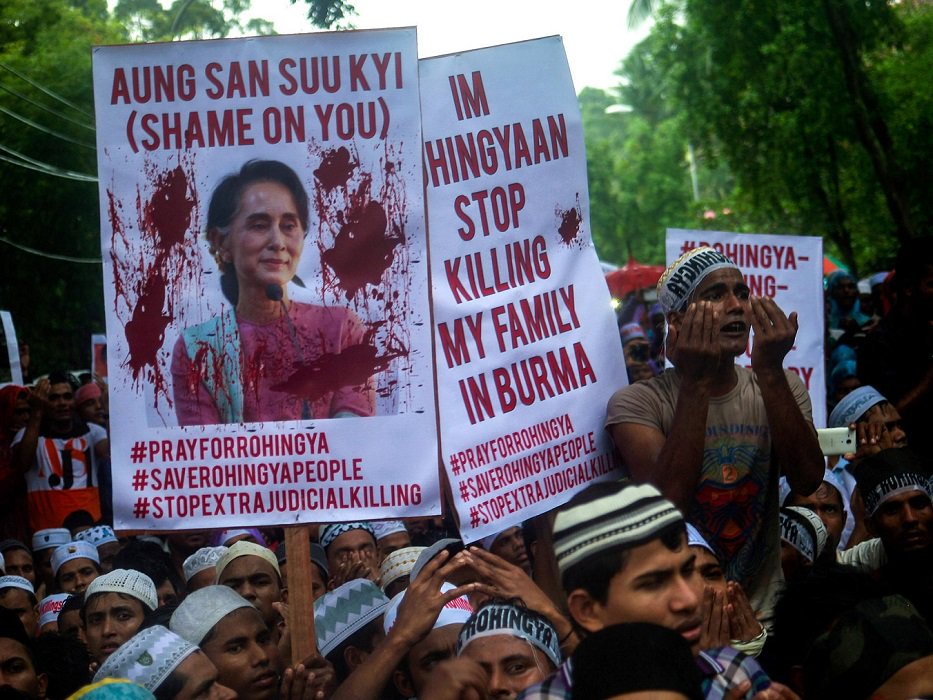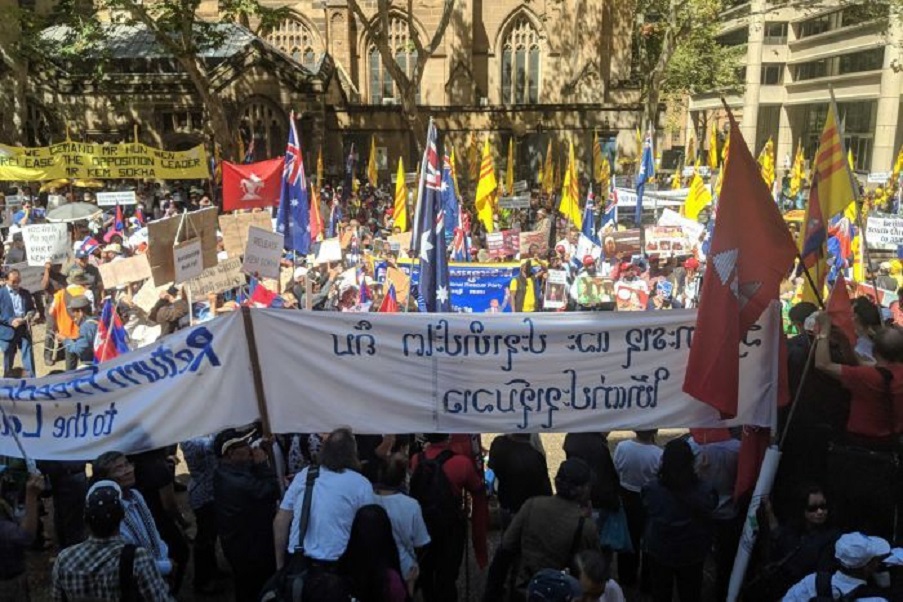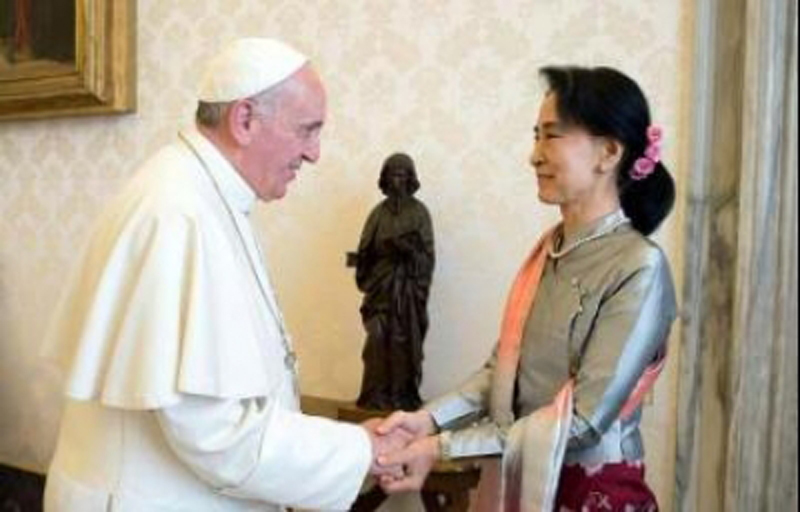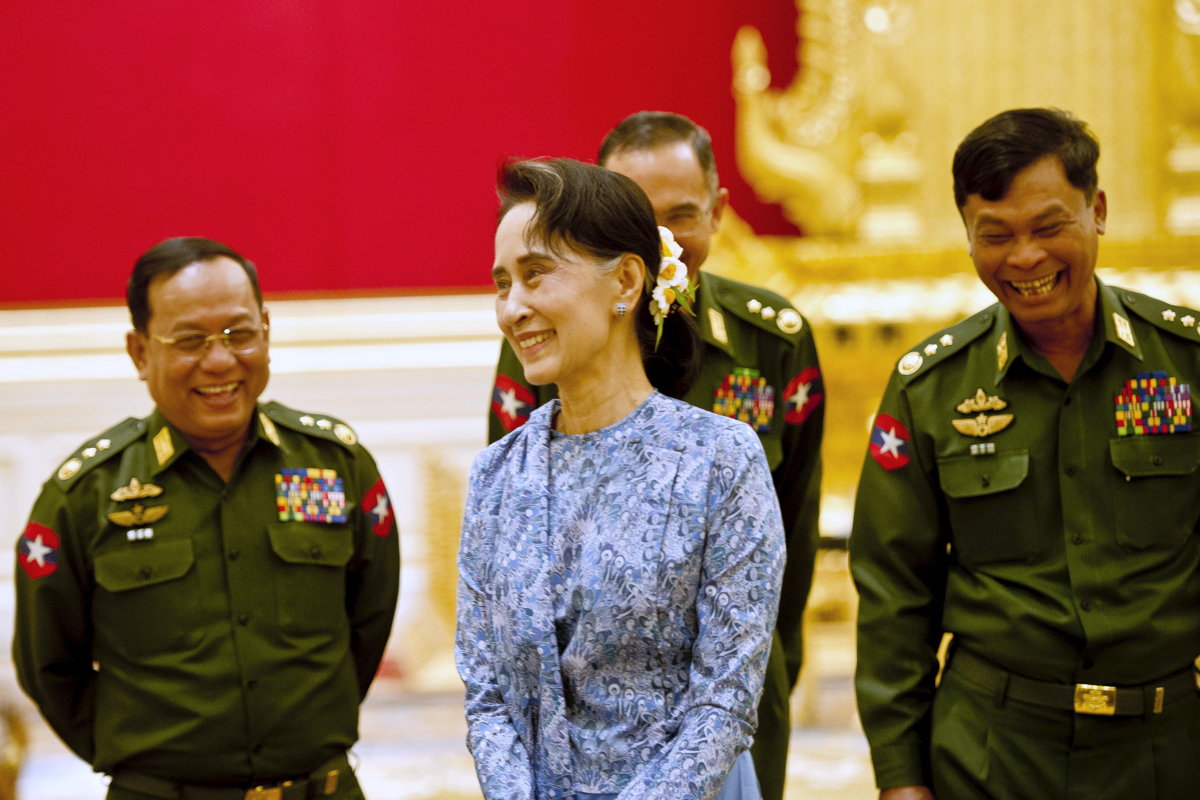SOME PEOPLE CURRENTLY IN DISCUSSION WITH INTERNATIONAL CRIMINAL LAWYERS TO RESOLVE ISSUE BY DRAFTING LAWSUIT AGAINST THE LEADERS OF MYANMAR'S HUMANITY ICON AUNG SAN SUU KYI AND CHIEF GENERAL OVER ROHINGYAS GENOCIDE.


In Rakhine Province of Myanmar (Burma) cleansing of people belonging to the Rohingya Tribe (mostly Muslims and few Hindus and Buddhists), has been going on for last two decades. But this cleansing project of Rohingyas is in full steam now by the Myanmar army and foot-soldiers of the Fascist Buddhist organizations with coming to power of Aung San Suu Kyi, a Nobel Prize recipient for fighting against military rulers of the country. Ironically, this Nobel laureate now supervises genocide of Rohingyas in collaboration with the country’s army and fascist Buddhist cadres.The rampaging killer/raping/maiming/burning gangs sponsored by the Burmese State, Army and Fascist Buddhist organizations have evoked worldwide condemnation including severe repudiation from world forums including UN. Myanmar’s State Counsellor and de facto leader Aung San Suu Kyi in a joint statement said, “It is important to maintain security and stability along the long land and maritime borders of India and Myanmar…India stands with Myanmar over the issue of violence in the Rakhine state which has led to loss of innocent lives.” This statement remained silent on the mass cleansing of the Rohingyas but expressed grave concern on the ‘terrorist’ activities of a section of Rohingyas in self-defence. In a more shocking development the RSS/BJP Indian Government has issued instructions to deport nearly 40,000 Rohingyas who escaped to India while under attack for being security threat.The inimical attitude of the Indian rulers towards Rohingyas is neither accidental nor sudden. It does not seem to be the fall-out of some grave security threat which might have cropped up in the recent past. The rampaging killer/raping/maiming/burning gangs sponsored by the Burmese State, Army and Fascist Buddhist organizations have evoked worldwide condemnation including severe repudiation from world forums including UN. Myanmar’s State Counsellor and de facto leader Aung San Suu Kyi in a joint statement said, “It is important to maintain security and stability along the long land and maritime borders of India and Myanmar…India stands with Myanmar over the issue of violence in the Rakhine state which has led to loss of innocent lives.” This statement remained silent on the mass cleansing of the Rohingyas but expressed grave concern on the ‘terrorist’ activities of a section of Rohingyas in self-defence. In a more shocking development the RSS/BJP Indian Government has issued instructions to deport nearly 40,000 Rohingyas who escaped to India while under attack for being security threat.The inimical attitude of the Indian rulers towards Rohingyas is neither accidental nor sudden. It does not seem to be the fall-out of some grave security threat which might have cropped up in the recent past. The rampaging killer/raping/maiming/burning gangs sponsored by the Burmese State, Army and Fascist Buddhist organizations have evoked worldwide condemnation including severe repudiation from world forums including UN. Myanmar’s State Counsellor and de facto leader Aung San Suu Kyi in a joint statement said, “It is important to maintain security and stability along the long land and maritime borders of India and Myanmar…India stands with Myanmar over the issue of violence in the Rakhine state which has led to loss of innocent lives.” This statement remained silent on the mass cleansing of the Rohingyas but expressed grave concern on the ‘terrorist’ activities of a section of Rohingyas in self-defence. In a more shocking development the RSS/BJP Indian Government has issued instructions to deport nearly 40,000 Rohingyas who escaped to India while under attack for being security threat.The inimical attitude of the Indian rulers towards Rohingyas is neither accidental nor sudden. It does not seem to be the fall-out of some grave security threat which might have cropped up in the recent past. The rampaging killer/raping/maiming/burning gangs sponsored by the Burmese State, Army and Fascist Buddhist organizations have evoked worldwide condemnation including severe repudiation from world forums including UN. Myanmar’s State Counsellor and de facto leader Aung San Suu Kyi in a joint statement said, “It is important to maintain security and stability along the long land and maritime borders of India and Myanmar…India stands with Myanmar over the issue of violence in the Rakhine state which has led to loss of innocent lives.” This statement remained silent on the mass cleansing of the Rohingyas but expressed grave concern on the ‘terrorist’ activities of a section of Rohingyas in self-defence. In a more shocking development the RSS/BJP Indian Government has issued instructions to deport nearly 40,000 Rohingyas who escaped to India while under attack for being security threat.The inimical attitude of the Indian rulers towards Rohingyas is neither accidental nor sudden. It does not seem to be the fall-out of some grave security threat which might have cropped up in the recent past. The Buddhist Rakhine made the false claim against the minority Muslim Rohingya that three Muslim youths raped and murdered a 26 year old woman. It was totally wrong as the minority Muslims did not do this against the Buddhist Rakhine. The woman was raped and killed by a gang of Buddhist Rakhine, one of whom was her boyfriend. There was a dispute between the woman and her boyfriend. The boyfriend tried his best to convince her to be his girlfriend again, but she refused and took a new boyfriend. Then, the ex-boyfriend, accompanied by his two close friends, took revenge by raping and killing her.The Buddhist Rakhine killers placed the dead body near a Muslim village without any knowledge of the murder. The Buddhist Rakhine and the Quaffer Burmese (Myanmar) authority accused Muslims of killing the woman. As a result, three innocent Muslim youths were arrested. One was beaten to death, and the other two were sentenced to death by the court. The government has shown the world that they created a fake issue to instigate a real event against Muslims.The situation of the Muslim Rohingya prior to the beginning of this genocideIn recent months, Rakhine extremists and xenophobes have released anti-Rohingya propaganda inside and outside of Burma by harping on the old slogan, “Rohingya is not a nationality in Burma. They are illegal immigrants from Bangladesh,” with intent to exterminate them ultimately.
Violence between Burma’s (Myanmar’s) mostly Buddhist army and Muslim ethnic Rohingyas in Rakhine State has sharply escalated in the last four days, to the point where it is feared that it may have reached a dangerous turning point.Starting in 2011, Buddhists have been attacking Muslims in villages across Burma, particularly the 1.1 million ethnic Rohingyas in Rakhine State. Mobs of Buddhists have attacked Muslims, conducting atrocities including torture and rape, killing hundreds and forcing hundreds of thousands to leave their homes to flee from the attacks. In some cases, the Buddhists have burned entire Rohingya villages to the ground.The current round of violence was triggered on Friday when Rohingya insurgents carried out a series of coordinated attacks against 30 Burma police outposts and an army base. Using knives, some guns and homemade explosives they killed at least a dozen security force members.The army responded with a sweep of violence against Rohingyas, causing thousands of them to flee their villages and head for the Bangladesh border, where they hoped to cross and reach a refugee camp. The Foreign Ministry of Bangladesh said Saturday that “thousands of unarmed civilians” from Rakhine state had gathered near its border and were “making attempts to enter Bangladesh.” The Burmese army shot them as they were fleeing, including women and children, killing dozens. However, Bangladesh already has 400,000 Rohingyas in its refugee camps and its border guards are refusing to allow any more to enter, and so the Rohingyas trying to flee are hiding out along the border between the two countries. However, an estimated 2,000 Rohingyas have made the crossing.Aung San Suu Kyi and Myanmar military chief discuss transfer of power.Pro-democracy leader holds one-hour meeting with top general Min Aung Hlaing to talk transition after her election victory.Aung San Suu Kyi has held direct talks with Myanmar’s top general for the first time as her party prepares to form the government in a country where the military retains considerable influence after decades of rule.Earlier in the day, the Nobel laureate also held talks with the president, Thein Sein, to discuss the transfer of power to her National League for Democracy (NLD), which swept to victory in elections in November. The support of the military will be crucial for the NLD to govern . Pope Francis said he wept hearing the plight first-hand of Rohingya refugees in Bangladesh, adding that this meeting was a condition set for his trip to Myanmar and Bangladesh.The Rohingya meeting was a highly symbolic gesture of solidarity with the Muslim minority fleeing violence in Myanmar, and the pontiff told journalists on his plane flying back to Rome that the refugees cried as well."I knew that I was going to meet the Rohingyas but I did not know where and how, for me it was one of the conditions of the trip," he said.The usually forthright pontiff walked a diplomatic tightrope during his four days in Myanmar -- the first papal visit to the country -- avoiding any direct reference to the Rohingya in public while appealing to Buddhist leaders to overcome "prejudice and hatred".In Bangladesh he addressed the issue head-on, meeting a group of Rohingya refugees from the squalid camps in southern Bangladesh in an emotional encounter in Dhaka."What Bangladesh has done for them is enormous, it's an example of welcome," he said. "I wept, I tried to do it in a way that it couldn't be seen. They wept too.""I told myself 'I cannot leave without saying a word to them'".The pope told the Rohingya: "In the name of all those who have persecuted you, who have harmed you, in the face of the world's indifference, I ask for your forgiveness."The pope referred to the refugees as Rohingya, using the term for the first time on the tour in Bangladesh after the archbishop of Yangon advised him that doing so in Myanmar could inflame tensions and endanger Christians.The word is politically sensitive in mainly Buddhist Myanmar because many there do not consider the Rohingya a distinct ethnic group, regarding them instead as interlopers from Bangladesh."If I had used the word during an official speech I would have slammed the door," he said, adding: "They already knew what I thought. For me the most important thing is that the message gets through."The pope said he was "very satisfied" with his meetings in Myanmar and hinted that he expressed his opinion far more freely in private conversations with the country's leaders than in his public appearances.More than 620,000 Rohingya have crossed into Bangladesh since a militant attack on police posts in late August sparked a deadly crackdown by the Myanmar military.They have given consistent accounts of mass rape, killings and villages deliberately burned to the ground by soldiers and Buddhist militia. The two countries last month signed an agreement to begin repatriating refugees to Myanmar, but rights groups say they are concerned about plans to house them in camps away from their former homes -- many of which have been destroyed.During his tour the pope led well-attended open-air masses in Bangladesh and Myanmar, which both have small Christian populations.Rights groups have raised concerns about the process, including where the minority will be resettled after hundreds of their villages were razed, and how their safety will be ensured in a country where anti-Muslim sentiment is surging.The signing of the deal came ahead of a highly-anticipated visit to both nations from Pope Francis, who has been outspoken about his sympathy for the plight of the Rohingya.The stateless Rohingya have been the target of communal violence and vicious anti-Muslim sentiment in mainly Buddhist Myanmar for years.They have also been systematically oppressed by the government, which stripped the minority of citizenship and severely restricts their movement, as well as their access to basic services.
 Pope Francis faces diplomatic test in Myanmar visit, where Rohingya flee alleged ethnic cleansing. Pope Francis is known for being outspoken in his support for the poor and downtrodden, particularly refugees.But on this occasion, he is expected have to choose his words carefully. Even using the term "Rohingya" could inflame tensions, the pope has been warned.
Pope Francis faces diplomatic test in Myanmar visit, where Rohingya flee alleged ethnic cleansing. Pope Francis is known for being outspoken in his support for the poor and downtrodden, particularly refugees.But on this occasion, he is expected have to choose his words carefully. Even using the term "Rohingya" could inflame tensions, the pope has been warned.
Myanmar: Why its military dictatorship still survives,the roots of Burma's military dictatorship and the opposition, led by Aung San Suu Kyi.The recent release from house arrest of the iconic Burmese opposition leader Aung San Suu Kyi generated headlines around the world. But more than 2,000 of her colleagues and others remain in detention – a fact which continues to highlight the mutually hostile relationship between the military government and its opponents.Burma (officially known as Myanmar) has the world’s longest surviving military dictatorship. What are the factors responsible for this – and what are the origins of the internal political conflict that has plagued the country for so long?Unlike most Asian and African countries, Burma did not win its independence by conventional civilian-based political agitation. Modern Burma was born partly out of an Allied military struggle against Japanese occupation – a struggle which, by 1945, also involved Burmese forces led by the leaders of what became the country’s post-independence army.A half century of military dictatorship has officially ended in Burma, or Myanmar. The cost has been high, with brutal war and systematic repression finally giving way to nominal civilian rule. Yet taking the final steps toward democracy may be as difficult as making the transition so far.For years it seemed like this day would never come. In 1962 the mystical military strongman Ne Win took control. The junta called an election in 1990, which gave a landslide victory to Aung San Suu Kyi, daughter of a respected independence leader, and her National League for Democracy. The junta voided the results and redoubled repression.But six years ago the so-called State Peace and Development Council transformed itself into a nominally civilian regime, with the military receding into the background. Suu Kyi, now a Nobel laureate, was released from house arrest. The transition was marred by imposition of a constitution which cemented military power, continuing violations of civil and political liberties, and wide scale persecution of the Muslim Rohingya. But free elections were held last November, in which the NLD overwhelmed candidates from the regime’s Union Solidarity Development Party, including cabinet members, party chairman, and parliamentary speaker.To that extent, Burma’s iconic military heritage is similar to that of Robert Mugabe’s Zimbabwe or to mid to late 20th-century Indonesia or even to the Caudillo (military leadership) tradition in post-independence 19th-century South America.In Burma the embryonic military, known as the Burma Independence Army, was first formed during the Second World War by anti-colonial Burmese nationalists in collaboration with the Japanese. Under Japanese occupation it became the Burma Defence Army (1942) and then the Burmese National Army (1943). As the war began to turn against Japan, the BNA switched sides and, supporting the Allies, became the Patriotic Burmese Forces.
 Aung San Suu Kyi and Myanmar military chief discuss transfer of power.Aung San Suu Kyi has held direct talks with Myanmar’s top general for the first time as her party prepares to form the government in a country where the military retains considerable influence after decades of rule.Earlier in the day, the Nobel laureate also held talks with the president, Thein Sein, to discuss the transfer of power to her National League for Democracy (NLD), which swept to victory in elections in November. The support of the military will be crucial for the NLD to govern .
Aung San Suu Kyi and Myanmar military chief discuss transfer of power.Aung San Suu Kyi has held direct talks with Myanmar’s top general for the first time as her party prepares to form the government in a country where the military retains considerable influence after decades of rule.Earlier in the day, the Nobel laureate also held talks with the president, Thein Sein, to discuss the transfer of power to her National League for Democracy (NLD), which swept to victory in elections in November. The support of the military will be crucial for the NLD to govern .
In her first public address since a bloody military crackdown on the Rohingya Muslim minority that has been branded “a textbook example of ethnic cleansing.